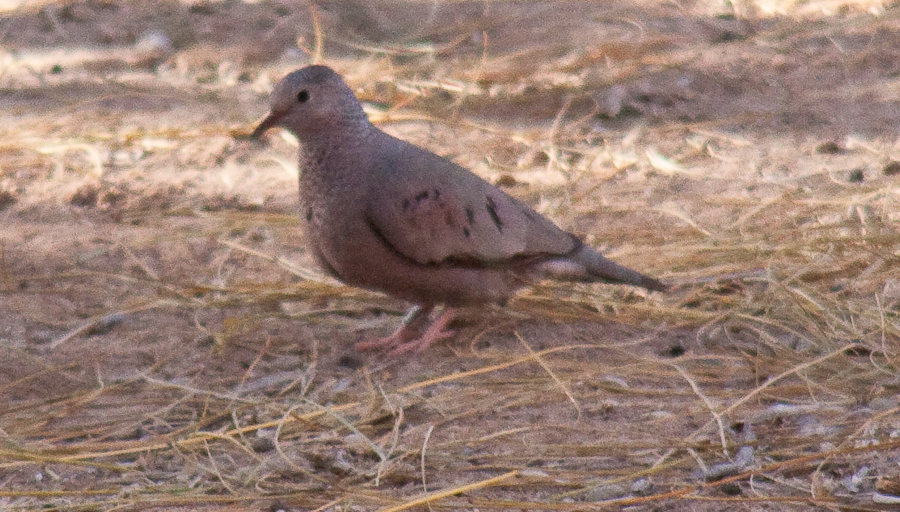April 10th, 2009
A couple of weekends ago (March 21-22), Beth was out of town so I decided to drive farther than normal from my usual O.C. stomping grounds. In particular, I decided to take a spin around the Salton Sea. It’s about 300 miles there, around, and back again, and seemed like a good fit for a weekend. I didn’t get as many life birds as I hoped but I did add two, plus one new species for my California list.
The first bird came almost as soon as I arrived Saturday morning. I drove down Lincoln Street to the Whitewater River delta. However all the gates were closed, and marked off with no trespassing signs. Bummer. However on the way back, I watched an Abert’s Towhee scurry off to the side of the road. This wasn’t a great look, and I might not even count it, except that I saw another one at my last stop of the day at the Sonny Bono Salton Sea Visitor Center, and two more the next morning in a vacant lot in Brawley. More often than not, the first bird is a “Is that what I think it was?” and you have to find a few more to be sure. That was the case for #465.
#466 though, left no room for doubt. I’ve looked for Common Ground-doves, without success at San Joaquin Wildlife Sanctuary in Irvine where they breed; but I found them all over the ground at the Sonny Bono Salton Sea Visitor Center where they were attracted to the feeders. Basically this is a sparrow-sized Mourning Dove. I even got pictures:

Although, just now as I look at the photos I notice this bird was banded. Hmm… That doesn’t necessarily mean it’s not countable; and I did see more than one individual, at least one of which flew. Still if this is not really a wild bird, it doesn’t really count. Fortunately, I found another one the next morning at the Riverview Cemetery in Brawley, and that one counts even if this one doesn’t.
Another birder also showed me a Barn Owl roosting right next to the center. Not a lifer but rare and special nonetheless. I also had a maybe on a Yellow-footed Gull after walking the path out to the Sea, but I couldn’t be quite sure.
Read the rest of this entry »
Posted in Birding | No Comments »
April 6th, 2009
You may have noticed that most of the moths I post here range in color from gray to brown so you’d think a pure green moth would be fairly easy to identify, but it turns out there are quite a few of these. Tentatively this has been identified as Dichorda illustraria – Hodges # 7055:

Santiago Oaks, 2009-04-05
Read the rest of this entry »
Posted in Bugs | No Comments »
March 31st, 2009
Yes, it’s Tuesday; but I was on a plane and then pretty jet lagged yesterday. Anyway, today’s moth is one from my Salton Sea trip two weekends ago. These moths were common on every built up surface in every campground. Best guess is that this is Perizoma custodiata, Hodges# 7328.

Mecca Beach Campground, Salton Sea, 2009-03-21
Read the rest of this entry »
Posted in Bugs | No Comments »
March 31st, 2009
I visited Brooklyn this past weekend. Despite jet lag, rain, and wind, I managed to spend a few hours in Prospect Park and picked up 39 species including 15 year birds:
- American Coot
- American Goldfinch
- White-throated Sparrow
- White-breasted Nuthatch
- Song Sparrow
- Ruddy Duck
- Rock Pigeon
- Ring-billed Gull
- Red-winged Blackbird
- Red-tailed Hawk
- Red-bellied Woodpecker
- Red-breasted Nuthatch
- American Robin
- Black-capped Chickadee
- Blue Jay
- Brown-headed Cowbird
- Canada Goose
- Common Grackle
- Double-crested Cormorant
- Downy Woodpecker
- Eastern Phoebe
- European Starling
- Herring Gull
- House Finch
- House Sparrow
- Mallard
- Mourning Dove
- Northern Shoveler
- Tufted Titmouse
- Ring-necked Duck
- Northern Flicker
- Hermit Thrush
- Northern Cardinal
- Wood Duck
- Great Egret
- Fox Sparrow
- Swamp Sparrow
- Eastern Towhee
- Brown Creeper
However, I did not find the Red-necked Grebe or the White-winged Crossbills that were reported earlier in the year.
Posted in Birding | No Comments »
March 23rd, 2009
Many-spotted Angle Moth, Hodges #6395, Digrammia irrorata
William R. Mason Regional Park, 2008-03-05

Read the rest of this entry »
Posted in Bugs | No Comments »
March 22nd, 2009
Details and pictures to follow but here’s the day list:
- Mallard
- Northern Shoveler
- Horned Grebe
- Eared Grebe
- Western Grebe
- American White Pelican
- Double-crested Cormorant
- Great Blue Heron
- Great Egret
- Snowy Egret
- White-faced Ibis
- Common Moorhen
- American Coot
- Black-bellied Plover
- Killdeer
- Black-necked Stilt
- American Avocet
- Willet
- Least Sandpiper
- Bonaparte’s Gull
- Ring-billed Gull
- California Gull
- Herring Gull
- Glaucous-winged Gull
- Caspian Tern
- Forster’s Tern
- White-winged Dove
- Mourning Dove
- Black Phoebe
- Say’s Phoebe
- Loggerhead Shrike
- Violet-green Swallow
- Verdin
- Northern Mockingbird
- European Starling
- Phainopepla
- Common Yellowthroat
- Abert’s Towhee
- White-crowned Sparrow
- Brewer’s Blackbird
- Great-tailed Grackle
- Brown-headed Cowbird
- House Finch
- House Sparrow
- American Wigeon
- Cinnamon Teal
- Green-winged Teal
- Ruddy Duck
- Gambel’s Quail
- Brown Pelican
- Cattle Egret
- Northern Harrier
- American Kestrel
- Peregrine Falcon
- Long-billed Curlew
- Marbled Godwit
- Long-billed Dowitcher
- Rock Pigeon
- Common Ground-Dove
- Barn Owl
- Northern Flicker
- Western Kingbird
- Blue-gray Gnatcatcher
- Yellow-rumped Warbler
- Chipping Sparrow
- Red-winged Blackbird
Read the rest of this entry »
Posted in Birding | No Comments »




